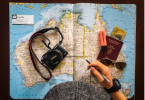Travel often brings a thrill rooted in the unknown—the streets unwalked, the meals untasted, the voices unfamiliar in cadence and tone. For many, stepping outside the rhythms of daily life and into something unpredictable is the very definition of adventure. Yet, amid all the novelty and exploration, there exists an intrinsic yearning for something known—something tethered to one’s internal compass. This is the paradox of travel: the drive to experience the new while craving the familiar.
In unfamiliar places, familiarity acts as a grounding force. It may come in the form of a morning ritual preserved across borders, a scent that evokes memories, or even a specific routine that brings a slice of one’s world into a foreign landscape. Comfort, then, doesn’t necessarily diminish the novelty of travel—it enhances it by offering stability amidst chaos. This balance becomes a subtle art that transforms trips into experiences that are not just memorable but also deeply personal.
Even in destinations like Pigeon Forge, TN, where nature, charm, and serenity meet, the most cherished moments often emerge not from grandeur, but from simple, familiar comforts rediscovered in new surroundings.
Creating a Sense of Home While Away
For many travelers, staying in a cabin provides more than just a place to rest—it becomes a private sanctuary where comfort meets novelty. The experience of waking up to the stillness of nature, the soft creak of wooden floors, and the warm glow of ambient lighting re-creates a sense of peace that’s usually lost in corridors or urban chaos.
Some settings are designed to offer more than just a temporary stay; the atmosphere found in Pigeon Forge luxury cabins, for example, mirrors the soothing essence of home, where quiet familiarity exists within the charm of something new. Whether enjoying a morning coffee on a quiet porch or unwinding beneath a blanket of stars, such spaces invite moments that feel timeless and deeply personal.
The Role of Routine in New Surroundings
Repetition, in travel, is often misunderstood. Some assume that rigid routines stifle spontaneity. Yet, the quiet power of a familiar routine can be transformative. It’s the early morning coffee, brewed just the right way, or the evening habit of journaling reflections before bed. These repetitive acts serve as anchors—small rituals that keep one rooted amid the drift of foreign experiences.
Incorporating familiar routines while navigating new environments does not dilute the authenticity of travel. Rather, it allows the mind to adjust more gently, keeping anxiety at bay and building a sense of control. It becomes easier to immerse in unfamiliar settings when a consistent thread—however small—runs through the day.
Familiar Sensory Experiences
Senses play a critical role in evoking memories and emotions. The warmth of freshly laundered clothes, the flavor of a well-loved dish, the background hum of a certain music genre—all contribute to a sense of familiarity. When in foreign settings, the presence of these sensory cues can be profoundly comforting.
The familiarity of certain smells, sounds, or tactile sensations serves to reassure the subconscious mind. In unfamiliar environments, this can reduce cognitive overload, offering the brain respite from processing too many new stimuli. This, in turn, makes space for genuine enjoyment and presence in the moment. Travelers who take the time to pack their favorite teas, carry their go-to playlists, or bring along their preferred scent find that these small items hold disproportionate emotional weight.
Connection Through Familiar Behaviors
Language barriers, cultural differences, and foreign etiquette can make interactions abroad feel transactional or strained. In such cases, behaving in familiar ways—smiling, holding open doors, or engaging in polite small talk—can bridge that emotional gap. Even when verbal communication fails, familiar body language often succeeds in building rapport and mutual respect.
Familiar behaviors also empower travelers to approach unknown situations with confidence. Whether it’s navigating a new transport system or trying unfamiliar cuisine, employing one’s usual methods of inquiry or approach offers a psychological advantage.
The Psychological Importance of Familiarity
Psychologically, the familiar offers predictability—a key factor in reducing stress and anxiety. The human brain is wired to seek patterns, and in environments where everything is new, the absence of patterns can feel disorienting. Familiarity, then, becomes the brain’s way of restoring a sense of order.
This is particularly important during longer journeys or solo travel. In such cases, extended exposure to the unfamiliar can lead to sensory fatigue, decision-making exhaustion, or even emotional detachment. Integrating familiar elements along the way can refresh the mind and sustain emotional well-being.
Cultural Exploration with Personal Anchors
Exploring a new culture does not mean abandoning one’s own. In fact, personal customs and familiar touchpoints can enhance appreciation for others. When a traveler brings along personal habits, tastes, or expressions, it becomes easier to draw comparisons and spot nuances in the host culture. This fosters deeper learning, empathy, and connection.
Personal anchors also prevent cultural disorientation, which occurs when travelers lose touch with their values or identities in the process of cultural immersion. Keeping a connection to one’s core routines or beliefs allows for a more authentic engagement with new environments.
Comfort as a Gateway to Deeper Exploration
Contrary to popular belief, comfort does not equate to complacency. On the contrary, the presence of comfort can encourage travelers to push their boundaries further. Knowing there is a secure base—whether it’s a daily routine, a comforting environment, or a sensory reminder—gives one the confidence to step further into the unknown.
Comfort creates a buffer zone—a psychological space that allows for risk-taking without overwhelming fear. It helps maintain emotional equilibrium, especially when dealing with unexpected challenges like missed connections, unfamiliar social norms, or sudden changes in weather. Those who cultivate their own comfort in foreign lands often find they can explore more freely, take more meaningful detours, and develop deeper connections with the places they visit.
Comfort in unfamiliar places is not a retreat from adventure but a foundation for it. It is the quiet, steady pulse beneath the noise of discovery. When the unfamiliar becomes overwhelming, it is the familiar that restores the soul.
When the journey is over, it is the familiar found in unexpected corners of the world that stays the longest in the memory, like an old friend who has met far from home.







